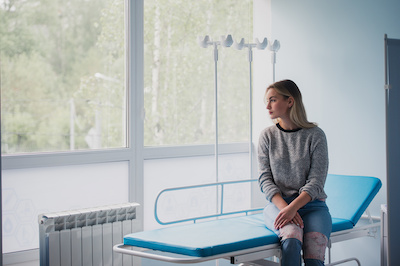Don’t let uncertainty about infertility treatment
during the novel coronavirus outbreak get you down.
We’ve got answers.

While many regions of the country are starting to relax their coronavirus restrictions, the American Society for Reproductive Medicine (ASRM) acknowledges that “it is highly probable that we will need to be operating in a COVID-19 environment for several months.”
The governor of Tennessee lifted the state’s stay-at-home order effective May 4. Yet for all of us at TRM infertility clinic – the physicians, lab techs, other staff members and our great patients – a lot of uncertainty remains as we have begun to reopen. We hope the following FAQ will answer some of our patients’ recent questions.
How is TRM handling coronavirus safety at the clinic?
Patient and provider safety remains our top concern. Our new office procedures include:
- Universal masking. Everyone will wear a mask.
- Patients should text us from their cars when they arrive.
- Patients will need to wait in their cars until we call them to enter the building.
- Patients will be called prior to their visit to screen for COVID-19 symptoms.
- We will take patients’ temperatures and ask about symptoms when they enter the clinic.
- Only patients (no guests) will be allowed to enter our office.
- A patient’s spouse or partner can join the patient’s in-office visit via telemedicine.
- The check-in and check-out desks now have plexiglass barriers.
For more information about changes to our clinic procedures, watch Dr. Jessica Scotchie’s video.
How does COVID-19 affect infertility treatments?
ASRM’s Coronavirus Task Force first recommended treatment delays in any but the most urgent infertility cases, which TRM adhered to. In its fourth update, the Task Force more recently, “issued recommendations for gradually and judiciously resuming the delivery of reproductive care.”
TRM is moving forward in providing treatment following ASRM’s detailed safety guidelines concerning the types of treatments and individual situations. We recommend that anyone thinking about starting infertility treatments talks to us. Our physicians are currently taking appointments with new patients via telehealth (audio and video) for initial consultations.
We can perform in-person consultations when needed but are trying to limit in-person consultations in order to minimize exposure to infections for patients and staff. For some patients, an in-person consultation is required by their insurance or state regulations (for patients who live outside of Tennessee).
ASRM also recommends that infertility patients who have underlying medical conditions that can increase the risk of complications from coronavirus should talk to a fertility specialist about the risks of starting treatment right now. There is a bright spot, however: No evidence exists indicating that delaying infertility treatments for a few months will affect the ability to conceive, even if age or diminished ovarian reserve are factors.
Expert Treatment. Total Commitment. TRM.

At Tennessee Reproductive Medicine, you’ll find a team of professionals dedicated to delivering the highest quality of compassionate fertility care.
Third-party reproduction during COVID-19
ASRM’s advice is that, “clinics should weigh the benefits and risks of proceeding for the involved individual(s).” Third-party reproduction is complex, and more so during the COVID-19 pandemic. We must consider the prospects for all parties, such as egg and sperm donors, the recipient parents, potential gestational carriers, and for the resulting fetus. This may require testing for the coronavirus.
Are my frozen embryos, eggs and sperm safe?
There is no imminent danger to frozen eggs, sperm or embryos, according to the Society for Assisted Reproductive Technology (SART). Our infertility clinic has voluntarily adopted stringent protocols to maintain the security of the liquid nitrogen tanks that store this tissue.
What are the risks of pregnancy during the coronavirus pandemic?
At this time, ASRM has reported the following findings on pregnancy and coronavirus:
- Newborns delivered at full term by mothers with active COVID-19 infections have been well overall.
- Any severe illness, including coronavirus, may trigger early delivery that results in neonatal complications associated with prematurity.
- One small study of women affected with COVID-19 who delivered via C-section showed none of the virus in the amniotic fluid, umbilical cord blood or breast milk.
The Centers for Disease Control and Prevention (CDC) reports that a small number of newborns have tested positive for COVID-19 after birth, but it is unknown whether these babies contracted the virus before, during or after birth.
What concerns us is what isn’t yet known about the virus. There is no data regarding the coronavirus’ effect on the fetus during the first or second trimesters. There is also no solid evidence as to whether the virus can be transmitted from mother to fetus.
For the most current recommendations from ASRM, see its updates and resources statements issued monthly. As always, you are welcome to contact TRM with any questions or concerns.
What can I do to make sure my treatment is not disrupted by COVID?
There is probably no way to prevent the disease in all cases, but you can minimize your risk by following some simple guidelines. The CDC guidelines to prevent the spread of COVID-19 are likely to be effective at minimizing the risk of getting infected. A quick summary of our recommendations:
- Both you and your partner should wear a mask in public when social distancing is not possible. If worn correctly, even cloth masks offer some protection.
- Sanitize your hands after touching community objects by washing with soap and water for 20 seconds or by using hand sanitizer with 60% alcohol.
- Avoid touching your face.
- Make sure you are well supplied with vitamin D (not a CDC recommendation but a safe recommendation because this is also good for pregnancy).
- Boost your immune system with exercise and good nutrition.
How can I handle stress caused by the uncertainty?
The CDC acknowledges that “fear and anxiety about a disease can be overwhelming and cause strong emotions.” The CDC recommends taking the time to take care of yourself, your friends and your family. Here are some ideas:
- Take breaks from watching, reading or listening to the news – that includes social media!
- During the day, stop for a few minutes and take deep breaths, stretch or meditate.
- Exercise or take walks.
- Try to eat healthful meals.
There has always been speculation about stress causing infertility. We know, however, that the converse is true: infertility can cause stress. Coincidentally, social distancing and coronavirus precautions trigger similar symptoms of distress, including depression, anxiety, isolation and a feeling of loss of control.
Taking care of yourself during this pandemic is doubly important for infertility patients. Recent research has found that therapy and other means of decreasing psychological distress have been associated with improved pregnancy rates.
Emotional and mental health is just as important as physical health, and the following resources can help.
- RESOLVE (The National Infertility Association) offers stress relief support resources.
- ASRM offers a directory of mental health professionals.
- The U.S. Department of Health & Human Services offers a behavioral health treatment services locator.

